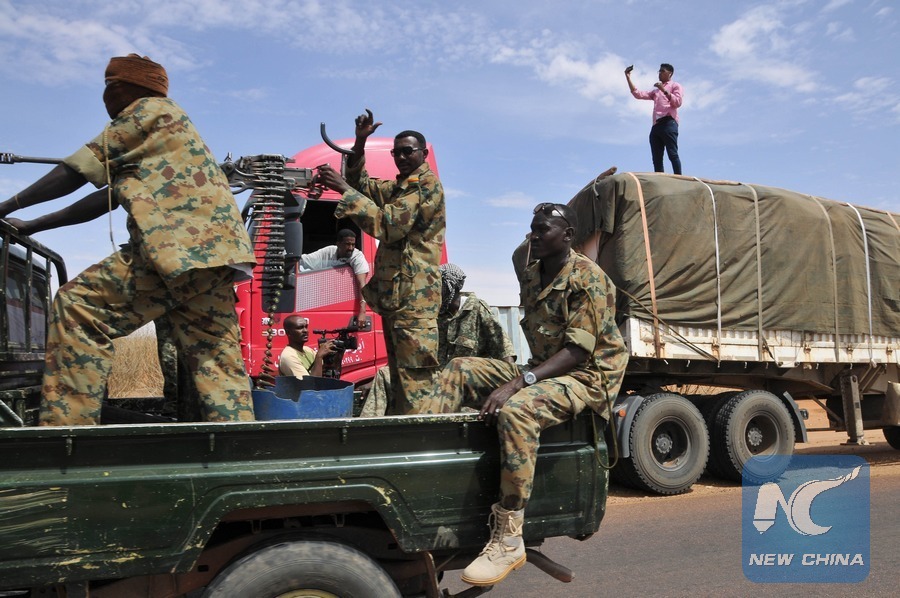
Photo taken on July 21, 2015 shows the Intergovernmental Authority on Development (IGAD) flag during the IGAD-Plus peace process meeting in Addis Ababa, capital of Ethiopia. The meeting which was held here on Tuesday was aimed at deliberating over a newly developed document by the IGAD on how to reinforce the peace process, to put the crises in South Sudan an end. (Xinhua/Michael Tewelde)
by Denis Elamu
JUBA, June 21 (Xinhua) -- Experts have urged the Inter-Governmental Authority on Development (IGAD) to move beyond rhetoric and disunity for it to achieve the elusive peaceful solution to the more than three years of conflict in South Sudan.
Augustino Ting Mayai, a political analyst at the Juba-based think tank Sudd Institute told Xinhua that the June 12th IGAD resolution that called for among inclusive participation of all opposition forces will only succeed when IGAD and African Union (AU) take concrete actions and speak decisively to the South Sudan warring leaders.
"IGAD has done its best on signing and operationalizing of the 2005 Comprehensive Peace Agreement (CPA) but it has also done nothing in terms of political settlement and conditioning violent parties leaving them to do as they like," he said.
Mayai revealed that competing interests within the regional countries were not good for providing lasting solution to the violence that has killed tens of thousands and left one million people on brink of famine amid massive refugee crisis in neighboring countries like Uganda, Sudan and Kenya.
"Sudan and Uganda may not see eye to eye on issues related to South Sudan, Ethiopia trying to dominate the regional political arena, Kenya trying to emerge economically. So there is that element of competition which bogs down the objectives of stability and development in the region," Mayai explained.
Jacob Dut Chol, senior political science lecturer at Juba University doubts whether the latest regional leaders' efforts will make any peaceful headway in ending violence.
"In my opinion there is nothing much that IGAD is doing and I don't think when they say they want to revitalize the peace agreement that they mean it. It is just a public relations statement," he said.
Chol said that despite the peace deal revival calling for inclusive participation of all estranged armed groups and reverting to the August 2015 peace agreement mediated by IGAD, it remains unlikely whether the former First Vice President Riek Machar who leads the main rebel group SPLA-In Opposition (SPLA-IO) will return from exile in South Africa and participate due to divisions over him within the region.
"There is no any hope that IGAD is going to bring back Machar because right now the region is highly divided. In the region if you don't have money to spread around then you cannot be able to achieve your objectives," he said.

Security members escort the convoys carrying food materials through the humanitarian corridor from Sudan's El Obied to Bentiu in Bahr el Ghazal State of South Soudan, May 19, 2017. The humanitarian corridors recently opened by Sudan government have contributed to the delivery of humanitarian aid to South Sudanese citizens and to lessening the famine there, according to aid organizations. (Xinhua/Mohamed Babiker)
Chol however, observed that the region leaders need to cajole President Salva Kiir to embrace its new peace deal revival roadmap so that the warring leaders and other fringe armed groups agree on the elections and peaceful resolution of conflict.
"What I do know is that the round table discussion will be connected to the national dialogue. The way the national dialogue has been formed is not the right way, the round table talks are likely to influence and shape the national dialogue differently and it's what IGAD is trying to push," Chol explained.
Mayai added that there is much need for the peace deal revival efforts to focus majorly on getting the two main warring groups to sit down and revise the weakened peace agreement following renewed July clash in 2016.
"The recent insurgent groups are important in terms of incorporating them into the dialogue and political process but they are not the major threat to peace and stability.
"Most of the hostilities taking place right now in the country concern the government and Machar's opposition. But their voice will matter in terms of a comprehensive approach to peace and security," said Mayai.
Political analyst James Okuk said the peace deal revival efforts point to acknowledgement of failure by IGAD leaders on South Sudan conflict due to complexities in the peace agreement.
He wondered how IGAD will manage to bring together the various armed groups which were not even part of the peace agreement and also winning the trust and confidence of the warring parties.
"At the end of the day they will not agree on the venue. The government may demand the meeting be in Juba and those in opposition may fail to agree for safety fear. Should any problem (fighting) occur will IGAD come to the rescue? Who will believe the guarantee of IGAD or Troika anymore?" he added.
He also urged Western countries especially Britain and the U.S. to lead the push for peace rather than preferring to push IGAD from behind.

